For the next hour, the widow pondered her ignorance and waited for the strangers to leave. A gray haze appeared on the southern horizon, and Ruha knew that a sandstorm was ravaging some distant part of the desert. She paid it no further attention, for it would not arrive soon enough for her to sneak to the oasis pond beneath its cover.
As At’ar grew brighter and hotter, Ruha’s skin became pale and clammy. She felt sick to her stomach. Her head ached. Spots appeared in her vision, and she could not make them go away.
Ruha turned her gaze toward the vultures, barely able to distinguish the birds from the dots before her eyes. “Surely, N’asr will punish these defilers of the dead. Ask him to do it now, so that I may live and prepare my husband for the journey to your father’s camp.”
If the vultures heard her plea, they gave no sign. The bulky birds continued hanging in the sky, steady as clouds.
The widow waited. She did not exert herself by searching for non-existent shade. In the summer, At’ar rode proud in the sky, and it would have been futile to attempt escaping her heat. Only a tent or a palm tree’s gaunt fronds could offer shelter from the sun, and the only sign Ruha saw of either was in the oasis. Everywhere else, on the gentle slopes and steep slip-faces of the dunes, and in the rocky valleys between them, At’ar blazed down on the parched sands in all her fiery radiance. The yellow goddess could not be avoided.
Ruha could feel herself growing perilously weak, but she resisted the dry voice whispering to her to sneak back to the oasis. Whoever the strangers were, their desecrations made it clear that they were no friend of the Bedine, and from what she had seen last night, the instincts of the one-eyed stranger were too sharp to challenge.
As she thought about the stranger, Ruha’s mind wandered and she once again found herself standing in last night’s shadows, the dead straggler lying in the sand beside her. The stranger was crouched atop the dune, where he had appeared so suddenly in the wake of the caravan. As the screams of dying Qahtanis began to drift over the sands, he continued to watch the battle, his attention fixed impassively on the oasis.
Ruha wondered if he was the man who killed Ajaman. Confident of the magic that kept her hidden and unheard, she gripped her jambiya and prepared to take vengeance.
As she picked up the handful of sand she needed to create her magical lion, the one-eyed man whirled about and drew a straight-bladed dagger. He stared into the quiet darkness protecting the young woman, seeming to sense her presence in spite of the spells hiding her. The stranger shook his head once, then sheathed his dagger.
Was he warning Ruha not to attack, or did he doubt the instincts that had alerted him to her presence? Before Ruha could decide, the stranger slipped down the other side of the dune and disappeared. The widow’s knees were ready to buckle and her stomach felt as though her heart had dropped into it. She did not follow.
With a start, Ruha realized that the ache in her stomach was more than fear, and that her confused mind had again lost track of reality. Heat cramps were causing the pain she felt, and the reason it seemed like night was because her eyes were dosed. She had lost track of reality again, drifting into a dream of last night.
Ruha held her head with both hands, vainly trying to stop the fierce pounding inside. The young widow realized she had to risk going to the pond, even without any spells to conceal her. With his acute instincts, the stranger would probably see her as she drank, but to wait was to die.
Ruha slid a few feet down from the dune crest, then turned toward the rocky labyrinth behind her.
To her surprise, a string of ten white camels stood two hundred feet away. Believing that her mind was playing tricks on her, she closed her eyes and whispered, “Husband, by the last drop of water in my mouth, if this is a mirage, I will be slave to N’asr himself before I wash your filthy corpse.”
When she opened her eyes again, the beasts were still there. Though clearly mature riding camels, they had no halters or saddles. Instead, their driver had looped long ropes around their lanky necks and run lines from one beast to the next. The sight puzzled Ruha, for any man who owned ten matched camels could certainly saddle them properly.
Only the lead camel, an indistinctive brown gelding, carried a proper saddle or halter. Upon this beast sat a lone tribesman, his bow strung and his lance resting across his thighs. He wore a tawny aba similar to Ajaman’s, and a white keffiyeh covered his hair. Though Ruha could not see his face at this distance, his head seemed turned toward her. Ruha guessed by his dress that the driver belonged to the Qahtan tribe, perhaps even her dead husband’s clan.
Continuing her slide down the dune, she croaked, “Worthy Ajaman, I should have known better than to doubt you, but I am a frail woman and thirst affects my judgment. Please forgive my nagging and don’t send any blights to punish me.”
When her feet touched the rocky desert floor, she checked to see that her veil was still in place, then staggered toward the man.
Upon seeing her condition, the rider unfastened his waterskin and slid off his saddle. He thrust his lance into the closest dune, then wrapped his lead camel’s reins around the shaft. Without actually running, for a wise man never ran in the heat of the day, he rushed toward Ruha.
The widow’s first impression was that he was a herdboy, for his face lacked even the hint of whiskers. His features were proud and strong, like Ajaman’s, but his skin looked as soft as a pup’s fur, and he did not stand even as tall as she did. He could have been no more than thirteen or fourteen. Still, Ruha stopped short of asking him to fetch his master. If the Qahtani customs bore any similarity to those of most Bedine, a herdboy would not carry a lance. That privilege belonged only to a warrior.
Instead, as the boy approached, she managed to gasp a question. “Whose fine camels are those?”
The youth showed a smile of pearly teeth. “They once belonged to a sheikh of the Bordjias,” he answered, straightening his shoulders as if donning an aba .
The answer explained the lack of saddles and halters. What the youth had left unspoken was that now the camels belonged to him. He had stolen them on a raid. If, as he claimed, the animals had belonged to a sheikh, the pasture had undoubtedly been a well-guarded one. Ruha was glad she had not insulted the young man by asking after his master.
The youth stopped a pace away from Ruha and passed the waterskin to her. Observing that he self-consciously kept one hand close to the hilt of his jambiya , Ruha said, “A careful warrior will make a wise elder.”
The boy nodded, then answered, “My father says it is honorable to help a stranger, but to remember that no friend is ever a stranger.”
“Your father is right,” Ruha answered, lifting the skin to her mouth.
Though the water was hot and tasted of several days in the skin, to her it seemed as if it had just come from a cool spring. Still, she stopped herself after three swallows, for drinking too much too quickly would make her feel worse than she did now. Besides, when a stranger shared his water, one never knew how much he had to spare. She offered the skin back to the youth.
The boy shook his head. “Drink. I have another.” He spoke with an exaggerated tone of authority.
Ruha allowed herself two more swallows. “Your water is sweeter than honeyed milk,” she said. Though she meant what she said, the words were weighted with exhaustion. They sounded insincere even to the young widow.
The youth smiled and shook his head. “That water’s been in the skin for five days. You’ve been out here watching my khowwan too long.”
Читать дальше
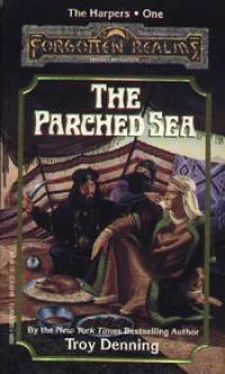

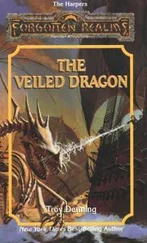

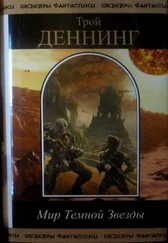
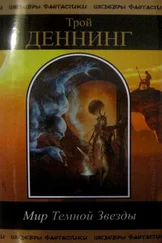
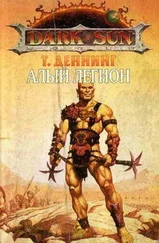
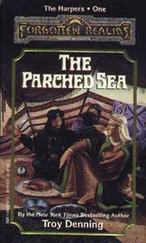



![Трой Деннинг - Тихая буря [litres]](/books/391050/troj-denning-tihaya-burya-litres-thumb.webp)